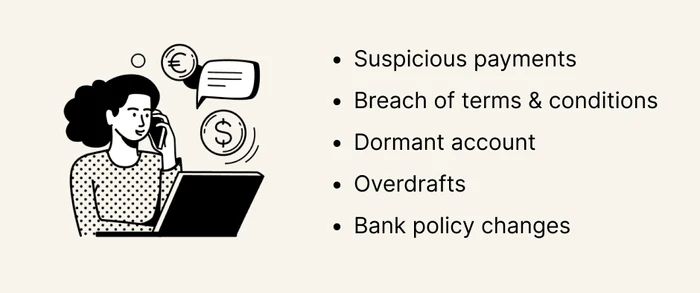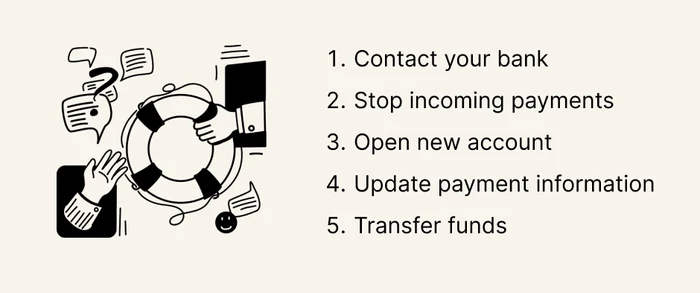Bank closed my business account: What to do?
In this comprehensive guide, we delve deep into the reasons behind banks closing business accounts and, most importantly, provide you with a roadmap on what to do next. From understanding the potential causes to offering actionable steps to navigate this challenging scenario, we'll equip you with the knowledge and strategies needed to regain control of your business finances.
What happens when a bank closes your account?
Once your account is closed, you will lose access to any funds in that account. It's essential to communicate with the bank to transfer any remaining funds to another account swiftly. Depending on the reason for this closure, the bank can release or freeze your money to investigate potential fraud.
Why did the bank close my business account?

Sometimes the banks leave you with little explanation as to why they have taken a decision to close your business account, and it may seem unfair. However, the banks are under no obligation to provide you with the reason. They usually give you a notice beforehand unless they have closed the account on suspicion of fraud or illegal activity.
One of the reasons for this lack of information is that, in cases of the latter, notifying the customer could be considered 'tipping off,' which means alerting suspicious customers to ongoing investigations and potentially obstructing them.
However, there are many factors that can contribute to a bank's decision to close your business account, l and they do not always have to do with crime. Moreover, non-compliance can happen unintentionally, leaving you wondering – what did I do wrong? Let's look at some of them.
Illegal activity
The closure of a business bank account due to criminal activity is a severe and legally mandated action taken by financial institutions. Banks are required to comply with strict anti-money laundering (AML), know-your-customer (KYC) and other laws and regulations designed to prevent financial crimes.
If a bank suspects that a business account is involved in criminal or illegal activity, it may close your account, start an investigation between the banks or even pass it to governmental authorities. Some of the activities that can trigger this are are following:
- Suspicious payment patterns: e.g., large deposits followed by immediate withdrawals may hint at money laundering.
- Payments to high-risk locations: e.g. sanctioned countries like Iran, Russia and others, or locations out of the bank’s own risk appetite.
- Payments to sanctioned individuals or companies: the names included in international sanctions lists.
- Fraudulent transactions: in case of credit card fraud or other unauthorised activities banks may close accounts to protect their customers.
- Inability/refusal to provide supporting documents: the absence of invoices, contracts or other supporting documents for payments hampers the bank's ability to verify transaction legitimacy.
- Criminal investigations: in some cases, law enforcement agencies may request or require to close bank accounts related to ongoing criminal investigations. This action is taken to preserve evidence and ensure compliance with legal procedures.
- Breach of terms & conditions: e.g., use of the account for personal transactions or payments to individuals, if not allowed by the bank.
- Inaccurate information provided during account opening: can include corporate identity theft or deliberate misinformation about the company.
High-Risk Occupation
The closure of a business bank account due to a high-risk occupation is a situation that can occasionally occur, although it is less common. Banks typically evaluate businesses before their onboarding and will not open an account for a business outside of their acceptable risk range. However, even if you are onboarded, the bank's policy could change in time, resulting in account closures.
The list of industries that are considered high-risk by traditional banks is usually much wider than that of e-money institutions. This includes not only expected sectors like adult content, cryptocurrency, cannabis, or gambling but also businesses in areas like marketing, logistics, finance, technology, and many others.
Zero Balance / Dormant Account
When an account remains idle for an extended period without transactions or balance activity, it may be deemed dormant. Maintaining a zero balance in a business account may violate the bank's terms and conditions. Banks do this to reduce administrative costs and mitigate potential security risks associated with neglected or inactive accounts.
Overdrafts
Repeatedly overdrawing the account without timely resolution can lead to account closure. It suggests financial mismanagement and poses risks to the bank and its customers, prompting the bank to take this step to protect its interests.
Changes at the Bank
Banks occasionally close business accounts due to internal changes or strategic shifts within the bank itself. These changes often involve restructuring, discontinuing services or change in risk appetite. For example, in May 2023 Wise imposed restrictions on residents of Turkey, causing many account holders to search for an alternative solution.
Consequences of a bank account closure
Firstly, it disrupts the cash flow of the business, potentially causing delays in incoming payments or paying suppliers, employees, or bills. This can harm the company's reputation and relationships with stakeholders. Additionally, a closed business account may affect the organisation's credit score, making it challenging to secure loans or credit in the future. It can also lead to additional fees and penalties for bounced payments and unpaid debts.
Steps to take if your business bank accounts are closed

Business bank account closed, what now? This experience can be a daunting situation for most businesses, but taking the right steps can help you navigate this challenge effectively. Here are some key actions to undertake:
- Contact your bank: Reach out to your bank immediately to understand the reasons behind the account closure. This communication can provide clarity on the situation and potentially offer solutions.
- Settle outstanding debts: If your account was closed due to overdraft or unpaid fees, prioritise settling these debts to prevent further damage to your credit history.
- Stop incoming payments: Pause any pending payments from customers or business partners to this account, provide them with alternative account details.
- Open a new account: If your company doesn't already have another business account in its name, the next step is to open one.
- Transfer funds: If there are remaining funds in the closed account, cooperate with your bank to swiftly transfer them to a new business account (or sometimes, UBO's personal account).
- Update payment information: Review and update any automatic bill payments, direct deposits, or billing information linked to the closed account to ensure a seamless transition to a new account.
- Seek professional guidance: If the closure is due to complex issues or regulatory compliance, consider consulting with a financial advisor or attorney with expertise in business banking to navigate the situation effectively.
How to get money out of a closed bank account
Recovering funds from a closed business bank account is a situation that demands careful navigation. Depending on the reason for account closure, this can take considerable time. To access your money effectively, follow these key steps:
- Contact the bank: Don't bargain or argue with the bank as it won't make them change their decision. Initiate and keep close communication with the bank that closed your business account as it will be their responsibility to initiate the release of funds. Understand the reasons behind the closure and inquire about the available options for accessing your funds.
- Provide them with alternative payment details: It cannot be a payment to another company – most often banks and payment service providers will ask you for another account in your company's name or a personal account of one of the company's beneficiaries.
- Seek legal assistance: In cases involving legal disputes or regulatory matters, your money can be frozen for the full time of the investigation. Consider consulting an attorney specialising in banking or business law to navigate the necessary legal processes.
How to prevent business bank account closures
Preventing business bank account closures is crucial to maintaining financial stability and operational continuity. Here are some essential steps to safeguard your business account:
- Know and follow bank policies: Familiarise yourself with your bank's terms and conditions. Adhere to transaction limits, maintain minimum balances, and meet all compliance requirements.
- Supporting documents: Always provide accurate documents, invoices or agreements to support your business payments.
- Communication: Establish open communication with your bank. Keep them informed of any significant changes in your business, such as ownership, address, or contact information.
- Regular activity: Keep your account active. Make regular transactions, even if they are small, to demonstrate ongoing use and engagement with the account.
- Manage overdrafts: Avoid overdrawing your account. Implement financial management practices to prevent overdrafts, such as monitoring balances closely and setting up overdraft protection if available.
Tips for opening a new bank account
When your bank account is closed, opening a new business bank account is a critical step to establishing financial stability for your business and its operations. Here are valuable tips to guide you through the account opening process:
- Choose the right financial institution: Research and compare different banks and payment institutions to find one that aligns with your business needs. Consider factors like fees, whether you need a basic bank account or additional services, such as FX, cards, overdrafts, availability of personal support and more, as well as accepted business industries, jurisdictions and regions they allow to transact with.
- Define account ownership: Determine who will be authorised signatories on the account. Clearly outline the roles and responsibilities of business owners, partners, or authorised employees. The best way to do it is to choose a business owner as the account holder.
- Consider online banks: Unless you already have several business current accounts, you'll likely want to open a new one as quickly as possible. Fully digital banks and e-money institutions can be a good option as their onboarding processes are typically faster, require no in-person branch visits or paperwork, and can be completed from anywhere in the world. If you require a single account for doing business globally, consider MultiPass. With MultiPass, you get guaranteed personal banking expert support, reduced onboarding complexities, and swift and efficient international transactions. And most importantly, a financial partner that understands the demands of your unique business.
FAQ
What happens when a bank closes your account with a negative balance?
You remain responsible for the debt. The bank will typically send the debt to a collections agency, negatively impacting your credit score. You may also incur additional fees and interest on the owed amount, making it crucial to address and settle the debt promptly.
Will having my bank account closed affect me getting an account elsewhere?
Depending on the reason for account closure, this could definitely be a red flag for other banks, although not necessarily the reason for denying you an account. If you have outstanding debts or are suspected of fraud, your bank could add your information to a 'blacklist' database, such as ComplyAdvantage, and this information will be accessible by other banks.
Can a closed bank account be reopened?
Reopening a closed bank account is possible, but it depends on the bank's policies and the reason for closure. In some cases, you may be able to reactivate the account by contacting the bank, paying any outstanding fees or balances, and meeting their requirements. However, success may vary by bank and individual circumstances.
Streamlined local and international transfers for UK and non-UK residents.